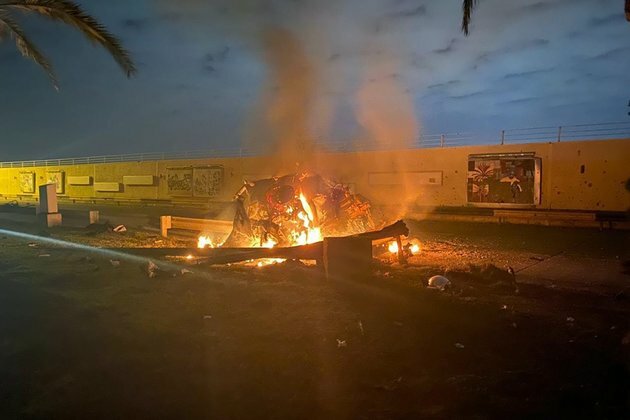Congress moves to reclaim its war powers
The Conversation
30 Jul 2021, 02:11 GMT+10

In mid-July 2021, a bipartisan and ideologically diverse group of senators proposed a new bill that, if passed, would dramatically shift the relative amount of power the president and Congress have over U.S. military operations.
Whether this bill passes as is, or with significant changes, or not at all, its proposal signals an effort by lawmakers to reclaim power over military action and spending that Congress has gradually surrendered over decades. It also puts pressure on presidents to evaluate their foreign policy objectives more clearly, to determine whether military action is, in fact, appropriate and justified.
As I've demonstrated in my research, even though the 1973 War Powers Resolution attempted to constrain presidential power after the disasters of the Vietnam War, it contains many loopholes that presidents have exploited to act unilaterally. For example, it allows presidents to engage in military operations without congressional approval for up to 90 days.
As a result of this shift from legislative oversight to presidential control, U.S. foreign policy has become less deliberative and administrations from both parties enjoy a significant amount of control over whether the U.S. calls in the armed forces to address developments overseas.
Setting new standards
This bill would end that loophole, requiring presidents to explain their actions more clearly to Congress and the public. Since Franklin D. Roosevelt, presidents have attempted to circumvent oversight and restraints from Congress by citing vague concerns like "national security," "regional security" or the need to "prevent a humanitarian disaster," when launching military operations. But they haven't typically given Congress more concrete information about the nature of the operation or its expected duration.
The new bill sets out a clear definition of which military activities need to be reported to Congress, and how quickly. This is especially important given the ambiguities that prior administrations have exploited. In 2011, a State Department lawyer argued that air strikes in Libya could continue beyond the War Powers Resolution's 90-day time limit because there were no ground troops involved. By that logic, any future president could carry out an indefinite bombing campaign with no congressional oversight.
The bill would also require the president to provide an estimated cost of the operation and describe the mission's objectives - both of which could help Congress determine whether a military operation had stayed within its intended bounds or gone beyond them.
Executive power grows
Before the Pearl Harbor attack forced the U.S. into World War II, Congress had exercised its war powers, preventing President Franklin D. Roosevelt from joining Britain, Australia and other nations in battle.
But in the wake of the attack, Congress began giving the president more control over the military, engaging in less oversight for fear of being painted as undermining the war effort.
After World War II ended, unlike in previous eras, Congress continued to relinquish those powers, largely by declining to rein in presidential actions that overstepped into congressional power.
Congress never authorized the war in Korea; Harry Truman used a U.N. Security Council resolution as legal justification. Congress' vote explicitly opposing the invasion of Cambodia didn't stop Richard Nixon from doing it anyway. Even after the Cold War, Bill Clinton regularly acted unilaterally to address humanitarian crises or continuing threats coming from leaders like Saddam Hussein.
After 9/11, Congress gave up more of its power much faster. A week after those attacks, Congress passed a sweeping Authorization for Use of Military Force, giving the president permission to "use all necessary and appropriate force against those nations, organizations, or persons he determines planned, authorized, committed, or aided the terrorist attacks that occurred on September 11, 2001."
In a followup 2002 authorization, Congress went even farther, allowing the president to "use the Armed Forces ... as he determines to be necessary and appropriate in order to defend national security" and "enforce all relevant United Nations Security Council resolutions regarding Iraq."
In the two decades since their passage, four presidents have used those authorizations to justify all manner of military action, from targeted killings of terrorists to the years-long fight against the Islamic State group, which continues to this day. This approach provides few, if any, congressional checks on the control of military affairs exercised by the president.
Threats of war
The Biden administration has called for more congressional oversight of military actions, saying the powers granted in 2001 and 2002 were too broad and invite abuse by power-hungry presidents.
And yet Biden has said he did not need anything beyond the Constitution to launch attacks in Syria in February and June 2021, saying he was doing so to defend U.S. forces. In mid-July 2021, Biden used the authorizations' power to launch a drone strike in Somalia against fundamentalist al-Shabab fighters.
But perhaps the most frightening use of these broad authorities was in January 2020, when President Donald Trump used the 2002 authorization to justify a lethal drone strike against a respected member of the Iranian government, Major General Qassim Soleimani, without consulting Congress or publicly explaining why the attack was necessary, even to this day.
The killing of Soleimani, who held a position in Iran equivalent to the director of the U.S. CIA, was described by the Trump administration only as "decisive action to stop a ruthless terrorist from threatening American lives." Trump's subsequent promises that Iran would "never" have a nuclear weapon were also backed up by the idea that Congress had effectively authorized him to take military action against Iran's nuclear program.
Tensions - and fears of war - spiked but then slowly faded, when Iran responded with missile attacks on two U.S. bases in Iraq, and Trump downplayed the severity of resulting injuries to American service members. But Iranian Supreme Leader Ali Hosseini Khamenei has continued to vow to get revenge for Soleimani's killing, leaving open the possibility of an Iranian attack at any time. Under the current legal structure, a U.S. response to that could come without congressional notification or approval.
The current congressional effort is noteworthy because it seeks to make presidents answerable to Congress for a wider range of military action, and to end the broad and sweeping power of the 2001 and 2002 authorizations that have effectively let presidents do anything with the U.S. military anywhere in the world without being held accountable at home.
[Understand what's going on in Washington. Sign up for The Conversation's Politics Weekly.]
Author: Sarah Burns - Associate Professor of Political Science, Rochester Institute of Technology 
 Share
Share
 Tweet
Tweet
 Share
Share
 Flip
Flip
 Email
Email
Watch latest videos
Subscribe and Follow
Get a daily dose of Iran Herald news through our daily email, its complimentary and keeps you fully up to date with world and business news as well.
News RELEASES
Publish news of your business, community or sports group, personnel appointments, major event and more by submitting a news release to Iran Herald.
More InformationBusiness
SectionAI saves $500 million for Microsoft as layoffs reshape strategy
REDMOND, Washington: Artificial intelligence is transforming Microsoft's bottom line. The company saved over US$500 million last year...
FTC’s rule to ease subscription cancellations struck down by court
WASHINGTON, D.C.: A federal rule designed to make it easier for Americans to cancel subscriptions has been blocked by a U.S. appeals...
Musk’s X loses CEO Linda Yaccarino amid AI backlash, ad woes
BASTROP, Texas: In a surprising turn at Elon Musk's X platform, CEO Linda Yaccarino announced she is stepping down, just months after...
Ex-UK PM Sunak takes advisory role at Goldman Sachs
NEW YORK CITY, New York: Former British prime minister Rishi Sunak will return to Goldman Sachs in an advisory role, the Wall Street...
Gold ETF inflows hit 5-year high as tariffs drive safe-haven bets
LONDON, U.K.: Physically backed gold exchange-traded funds recorded their most significant semi-annual inflow since the first half...
PwC: Copper shortages may disrupt 32 percent of chip output by 2035
AMSTERDAM, Netherlands: Some 32 percent of global semiconductor production could face climate change-related copper supply disruptions...
Middle East
SectionGaza War sucking life out of an Israeli generation
In the past month alone, 23 Israeli soldiers have been killed in Gaza—three more than the number of remaining living hostages held...
Saudi Aramco plans asset sales to raise billions, say sources
DUBAI, U.A.E.: Saudi Aramco is exploring asset sales as part of a broader push to unlock capital, with gas-fired power plants among...
UAE delegation visits Netherlands, Belgium to explore cooperation opportunities in R&D, critical, emerging, advanced technologies
The Hague [Netherlands] July 12 (ANI/WAM): JA UAE delegation led by Omran Sharaf, Assistant Foreign Minister for Advanced Science and...
We expect a positive response, says husband of Kerala nurse on death row in Yemen
New Delhi [India], July 12 (ANI): Tomy Thomas, husband of Nimisha Priya, the 37-year-old Indian nurse from Kerala who faces execution...
Gaza becoming "graveyard of children, starving people," says UNRWA chief, as nearly 800 killed at aid centres
Tel Aviv [Israel], July 12 (ANI): Gaza has become the graveyard of children and starving people, UNRWA chief Philippe Lazzarini said,...
Esports World Cup: Tiebreakers sort out Groups C, D in Dota 2
(Photo credit: Kelley L Cox-Imagn Images) A pair of best-of-three tiebreakers helped determine the final order of Groups C and D...













